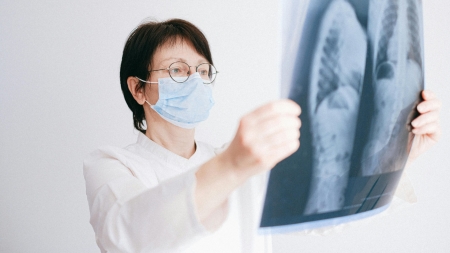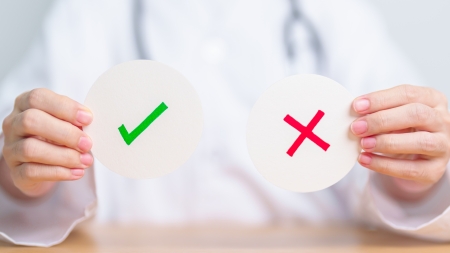Symptoms and treatment of lung cancer
With symptoms ranging from coughing and shortness of breath to unintentional weight loss, there are a number of different signs of lung cancer. How is it diagnosed and treated, and what are the chances of recovery?

In any given year, 4,900 people are diagnosed with lung cancer in Switzerland. The majority of those diagnosed are aged 50 and over.
What is lung cancer?
Lung cancer, or bronchial carcinoma, is a malignant tumour in the lungs. When a malignant tumour forms, cells multiply uncontrollably and can invade and damage healthy tissue. The tumour cells can spread throughout the body via the lymphatic system and the bloodstream. A mass of these cells in other parts of the body is called metastasis. Lung cancer tends to metastasise mainly in the lymph nodes, bones, brain, adrenal glands and liver.
What symptoms and health issues might indicate lung cancer?
The following symptoms and health issues may be signs of lung cancer:
- persistent cough that lasts for several weeks and does not go away despite treatment.
- an existing cough changes suddenly
- shortness of breath even at rest or when engaged in light activity
- pain in the chest
- sputum containing or not containing blood
- unintentional weight loss
Please note that the symptoms listed may also be consistent with other illnesses. Do you have symptoms like these? If so, speak to your GP about them.
What are the causes of lung cancer?
Lung cancer can affect anyone, through no fault of their own. It is a known fact that smoking is the biggest risk factor for developing lung cancer.
How is lung cancer diagnosed?
In order to diagnose lung cancer, a number of tests must be carried out. The tests required vary from person to person. The most important tests include:
- examination by a doctor
- pulmonary endoscopy, also known as bronchoscopy.
- X-ray or computer tomography of the lungs
Please click here for more on examinations (link in German).
How is lung cancer treated?
The main types of treatment are: surgery, medication-based treatments and radiotherapy. Surgery is performed to remove the tumour. Radiotherapy is used to destroy cancer cells in the lungs on a localised basis. Medication-based treatments fight cancer cells throughout the body. These include chemotherapy, immunotherapy and targeted therapies.
The chances of recovery vary depending on the nature of the disease and the person affected, which is why it is individual.
Click here for more on how lung cancer is treated (link in German).


